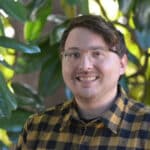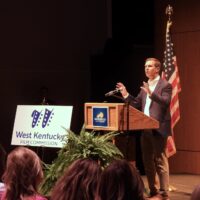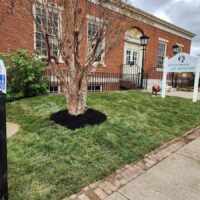Life-size statues of a trio of music legends with Central City roots were dedicated on Friday in the small Western Kentucky community’s downtown.
Bronze renderings of John Prine, who immortalized Muhlenberg County in his song “Paradise,” and Don and Phil Everly, two of the biggest stars in early rock and roll, now stand in the city’s new Festival Square.
All three figures loom large in the community’s storied local music history. The thumbpicking guitar technique was invented and perfected in the area by local musicians like Merle Travis and Ike Everly, daddy to Don & Phil.
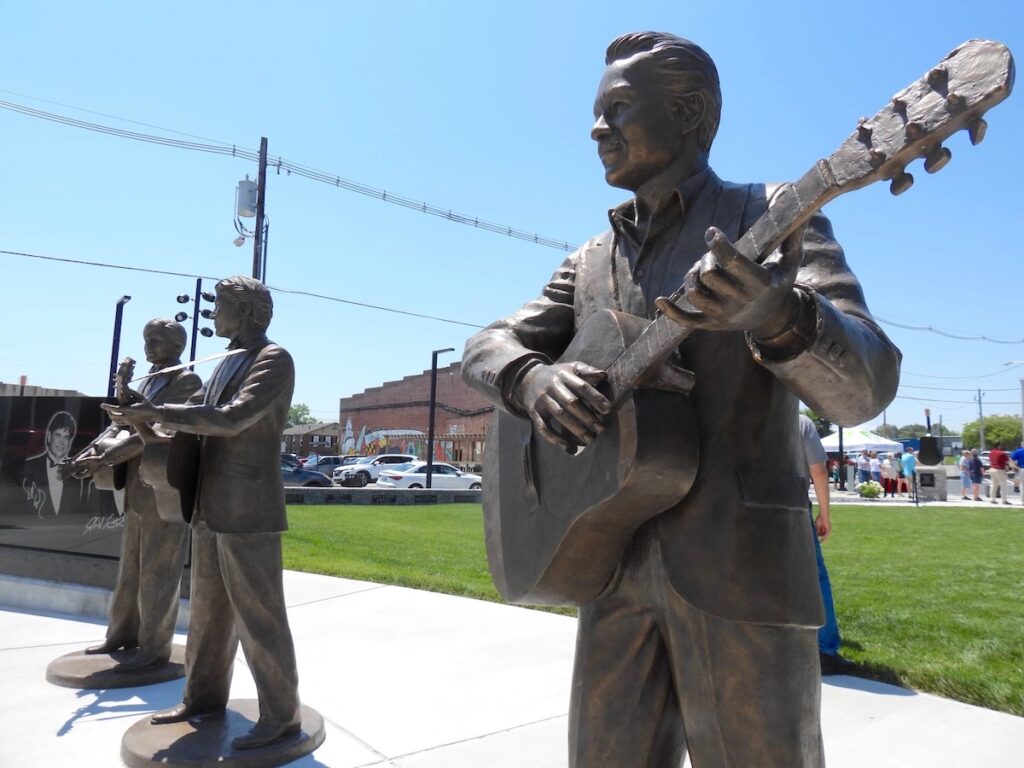
The pair’s harmonies made them one of the biggest acts in early rock and roll. They released dozens of successful singles, including smash hits like “Bye Bye Love,” “All I Have To Do Is Dream” and “Cathy’s Clown.”
Local officials made some remarks and Kentucky Poet Laureate Silas House dedicated poems to the Everlys and Prine. Members of both the Everly and Prine families were also in attendance.
Ted David Everly said during the dedication that echoes of his relatives’ music can be heard in the work of other pairs like Paul McCartney & John Lennon and Paul Simon & Art Garfunkel, as well as modern day hitmakers like Taylor Swift.
“Don and Phil had a sound together that could not be duplicated. That sound propelled them to stardom,” he said. “Our beloved sons, Central City’s own Everly Brothers, have either inspired directly or indirectly everybody in the music industry today.”
Don Everly was born on the outskirts of the town. His younger brother Phil was born in Chicago, but the pair loved to come home to Kentucky and helped organize an annual music festival to benefit the community for more than a decade, often with Prine — whose parents were both from the area.
Jack Prine made an emotional return to Muhlenberg County for the first time since his father’s death for the dedication.
“Coming here and being surrounded by the love and appreciation that everyone has for my dad, it really just means the world to me,” he said. “I know my dad had a lot of admiration for the Everly Brothers, and I know that he would be absolutely over the moon to have his statue right next to them. Although, I think if he could have it his way, my dad would have wanted a statue of himself in the garage next to his Cadillac.”
John Prine was born outside of Chicago, but he regularly visited Western Kentucky with his family. The country-folk singer/songwriter wrote “Paradise” about his visits to Muhlenberg County and the former coal community of the same name. Rolling Stone has called him “the Mark Twain of American songwriting” because of the depth of humor and emotion at play in his lyrics.
Kelsey Waldon, a rising country singer/songwriter from Ballard County, had a deep relationship with Prine’s music before she signed with his Oh Boy label in 2019. To her, his songwriting combines country music with a truthful, relevant — and at times punk rock — lyrical spirit.
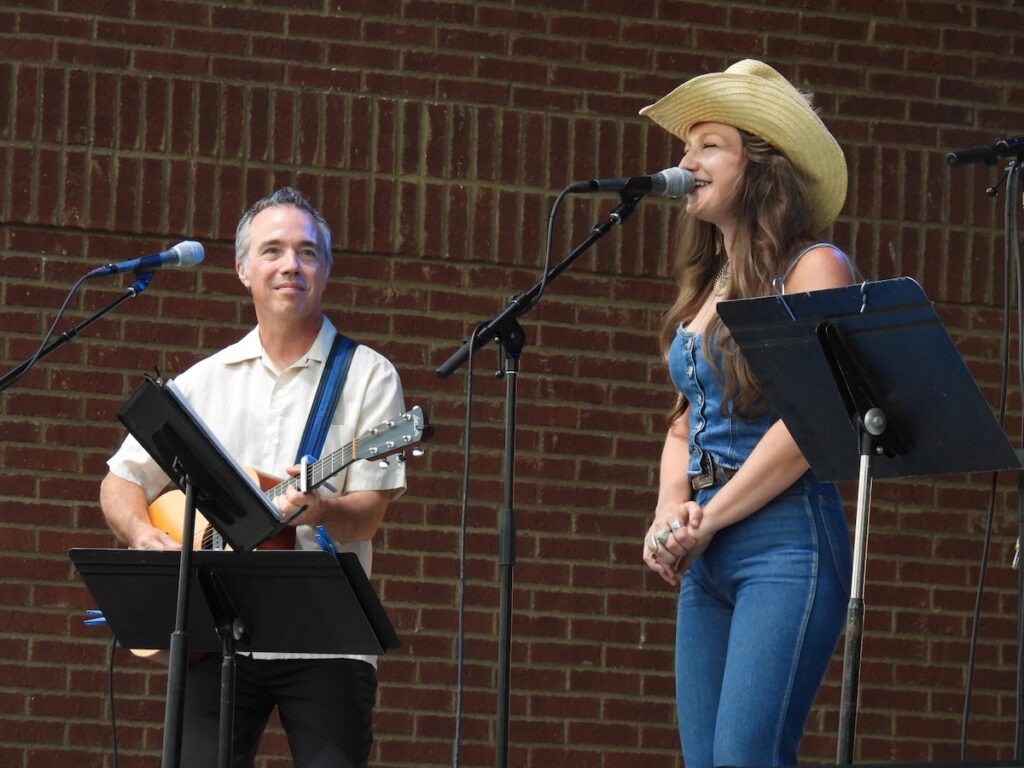
“John was really the first songwriter that I kind of fell in love with when I started writing songs,” Waldon said. “He told the story of the South in, like, the complex but also simple way that it should be. There’s just a lot of kind of stereotypical songs out there about the South and I feel like John was really able to pull back and show the beautiful layers and complexities of normal people.”
Waldon performed with Prine numerous times before his death in 2020, and came to view the songwriter as a mentor.
“We saw all of ourselves in each other,” she said. “The fact that he has roots in Muhlenberg County has always meant so much to me. It’s part of our legacy. I felt like we were truly kindred spirits.”
The initial budget for the local project was around $300,000, but Central City Tourism executive director Freddy Mayes said that it grew to just north of $1 million.
Much of that money, he explained, was made up of private gifts from more than a hundred individual donors and local groups. Farmers Bank donated the land Festival Square sits on and the Felix E. Martin Foundation, a local nonprofit philanthropy group, also provided some financial support.
In Festival Square, visitors can see the statues, replicas of Prine and the Everly Brothers’ guitars, names of donors, some statues of musical notation and a set of 20-foot granite walls that tell the histories of the artists and the local music festival — the Everly Brothers Homecoming — that the rock duo helped put together to benefit the community for more than a decade.
“Any one of those artists, their successes would have been a positive impact or positive reflection of our community,” Mayes said. “To have so many people achieve in so many different ways. It’s like we take that for granted. That’s remarkable.”
The Muhlenberg County Music Museum, not far from Festival Square, tells a more in-depth history of Prine and the Everlys. It also documents the stories of some of the area’s other big cultural exports — like actor Warren Oates, who was born in Depoy and went on to star in films like The Wild Bunch and Two-Lane Blacktop, and Jim Walker, the renowned Greenville-born flutist who played on dozens of iconic movie scores and led the the jazz ensemble Free Flight in addition to his classical career.
Sue Aubrey works at the museum now but, when she was 16, she worked at a local restaurant where she met the Everly Brothers. Decades later, she still remembers their “very nice manners.”
“I think that’s what caught my eye. And then later on, when I started working down here, I got to know more about the brothers and their music,” she said. “It’s something that’s never gonna be repeated, I don’t think, in history. When you hear the Everly Brothers, you know it.”
After the dedication, musicians — including Prine’s brother Billy, members of Prine’s touring band and Waldon — paid tribute to the three local icons at the nearby Lu-Ray Park & Amphitheater.
David Hall, a military veteran from Muhlenberg County, came to listen.
“It makes a person proud that they’re from this area,” he said. “That way of life is instilled in each one of these people around here and we take care of each other and we love each other.”
Billy Prine, who still tours and sings his brothers songs, said seeing the statue of his brother dedicated was special.
“It’s just amazing today what they’ve done to Central City,” he said. “It’s really, really a treasured moment. I’m just so glad to be here.
John Prine died from complications with COVID-19 in 2020 and Don Everly died in 2021. Phil Everly succumbed to lung disease in 2014.
Gloria and Phillip Walley of Central City, who also attended the tribute concert, are longtime fans of Prine. They said his songwriting can never be matched.
“I love John Prine’s stories,” Gloria said. “His music tells stories and that’s what I like about his music.”
To Phillip, the Grammy Award-winning artist is truly unique: “There won’t ever be another John Prine.
Earlier in the day, Ted David Everly quoted the lyrics to the Phil Everly-penned “When Will I Be Loved” — which was later famously covered by Linda Rondstadt — and answered the titular question.
“I would say forever. Don and Phil, you’re gonna be loved forever,” he said. “The statues are gonna be there for generations to come.”
(This story first ran on WKMS, the public radio station at Murray State University.)
